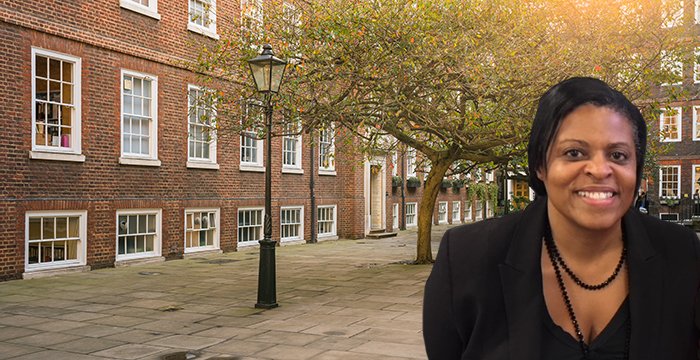Ahead of Legal Cheek’s ‘How to make it as a barrister’ event tomorrow, Legal Cheek Careers meets National Director of ULaw’s BPTC Jaqueline Cheltenham

Jacqueline Cheltenham, National Director of The University of Law’s Bar Professional Training Course (BPTC), knows a thing or two about what it takes to be a barrister. Not only is Cheltenham one of the key figures behind ULaw’s BPTC — which can boast that more than two-thirds of its students achieve pupillage — she can also speak from experience.
“I was called to the bar in 1992, and practised as a criminal barrister for five years,” says Cheltenham. “I really enjoyed the work, acting for both prosecution and defence in assault, burglary, robbery and possession of drug cases. I loved working as an advocate.”
Cheltenham was a barrister with London criminal set Charter Chambers, where she remains a door tenant, and is a member of Middle Temple. She was encouraged to go into the law by her father Bruce, a lay magistrate in Bexley and Bromley for many years until he retired at 70.
“I was brought up in Sidcup, did ‘A’ levels in English, History and French, and then studied English Literature at Durham,” says Cheltenham. “But my father would often tell me that I’d enjoy the law. His brothers, Sir Richard Cheltenham and Pat, are both prominent lawyers in Barbados and the Caribbean — law is very much in the family. So after graduating at Durham I did the law conversion course.
Next up was bar school, and then immersion in criminal law as a barrister — but something was nagging away in Cheltenham’s mind.
“I’d always wanted to teach, but during my sixth form my teachers had persuaded me not to go down this route,” explains Cheltenham. “Eventually, although I was happy being a barrister, the urge to try my hand at teaching became too strong. The turning point was a practitioner evening — a workshop in which students would conduct mock bail applications. I found myself wanting to help them and knew that I had to switch to teaching.”
Another factor in Cheltenham’s switch was the desire to know how defendants were faring. “I would often represent youths and when I secured a non-custodial disposal for them, I always wanted to know how they got on — especially whether it had helped turn their life around. However, that was not something I would find out, unless I found myself representing them again in a year’s time, which sadly happened too often. With teaching, I felt I’d be able to follow and assist with a student’s journey.”
The bar’s loss would be ULaw’s gain. Cheltenham joined the College of Law (rebranded as The University of Law in 2013) in 1998, to teach criminal law. She found teaching every bit as rewarding as she’d hoped, but in 2004 made a switch into the managerial side, becoming the National Director of ULaw’s BPTC. Under Cheltenham’s stewardship, ULaw’s BPTC has become the surest route to pupillage in the UK: 66% of its full-time students graduating in 2016 secured a pupillage within one year of successfully completing the course. Cheltenham adds that “22% of our full-time graduates that year gained an ‘Outstanding’ grade — a lot more than the national average of 13%.”
Academic success is not everything, cautions Cheltenham:
“Practical experience is essential. Young advocates should try and experience between three and five mini-pupillages, and use them to decide what kind of law they prefer. It’s a very competitive market, so they need to persevere and keep sending out applications. Work experience in a solicitor’s practice is great, too, and they should also be able to show a real interest in the law, for example by doing pro bono work at law school clinics and law centres, or by, for example, volunteering as a police station visitor (known as independent custody visitors), which means ensuring those in custody are kept in the right conditions.”
Pro bono work comes with the territory for those students who commit to ULaw’s BPTC LLM. “Students on our LLM advise, manage and represent clients on a variety of cases including family, housing and immigration law,” says Cheltenham. “They gain real ‘on your feet’ advocacy experience, and our rigorous selection process means that their cohort is comprised of bright and talented students who all have a sense of sharing the same journey.”
Cheltenham’s own journey now sees her happy and content in her work and living in Beckenham. If she’s not rushed off her feet thanks to her two young sons, she plays netball twice a week; she sometimes wonders whether she might one day put her English degree to use to and do some writing. Meantime, though, her focus is firmly on ULaw’s BPTC:
“At open days, prospective students always find our tutors to be very open and accessible. We offer a very good environment for them. We’re determined to keep it that way.”
Jacqueline Cheltenham will be speaking at our ‘How to make it as a barrister’ event in London on Thursday 14 June. Apply to attend here. You’ll be asked to submit a CV and two questions for the panel.



